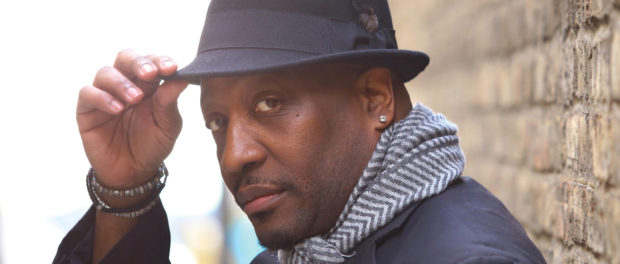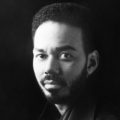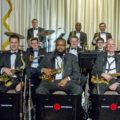Meet creator, interpreter Devin B. Thompson, the next generation of Chicago soul and blues
 Photos provided by Severn Records
Photos provided by Severn Records
The Windy City’s never had a shortage of passionate soul and blues singers, but it’s been a minute since one truly stood out as both a genuine appreciator of the unsung heroes that came before him and a talented torchbearer for the next generation.
Enter Devin B. Thompson, whose foundation in gospel, the benefit of battling it out with other hungry acts at the same high school Lionel Richie attended and having a personal mentor in late great R&B veteran Willie Newsome (who recorded as Willie Parker and Frankie Newsome, while performing alongside The Impressions, The Dells, Jackie Wilson and The Jackson 5) led him to a deal with Severn Records.
Given that company’s commitment to “roots music for the 21st century” (think a present day version of Stax), the trumpet player turned socially conscious singer/songwriter, and vintage interpreter of everyone from Bobby Blue Bland to Little Milton and Joe Simon, more than fits the bill.
Chicago Concert Reviews pulled up virtual seats in the pew of his powerhouse congregation and the recording studio to hear all about “Tales Of The Soul,” which features a track inspired by quarterback/activist Colin Kaepernick, guest ace guitarist Robben Ford (George Harrison, Miles Davis, Joni Mitchell) and a steadfast commitment to maximizing actual musicianship.
 What did growing up in church bring to your future pursuit of music?
What did growing up in church bring to your future pursuit of music?
Devin B. Thompson: I grew up southwest of Chicago in the city of Joliet. I attended a church called Mt. Zion Baptist Church where I was surrounded by plenty of extremely gifted musicians and singers, some being family members and very close family friends. My immediate family all sang in the choir or were involved in the music department in some way or another. As a kid, I watched these amazingly gifted people, my dad being amongst them, along with Willie Newsome and Ann Nesby from Sound Of Blackness, tear up the church. I always saw myself doing the same thing some day when I got older. I learned how to embrace the lyrics and how to be soulful from my church. It was only natural, and encouraged, to pursue a career in music by the very people who were bringing down the house!
Out of the many performances you’ve had around town, either while starting out or as a full-fledged professional, what are a few that you’ll never forget?
Thompson: The two that come to mind are the Joliet East High School talent show, and much later on, the ASCAP Showcase at the China Club. Joliet East High was not really known for their sports, but the fine arts department was great and our talent show was the best in town! Everyone from other high schools would audition for a spot in the show and audiences would let you know if you were killing it of not. I was a member of my big brother’s band, Mezzo Forte, and I was only 12 at the time, so it was my first time in front of an audience other than church. We were received very well and I had bragging rights to my friends back at my junior high on being picked to perform at the show.
I was 21 and in the same band [for the] ASCAP Showcase at the China Club [where we were just] one of three in the country. What’s so memorable about this show is we had our first chance to perform an all original set of music and there were a few celebrities in the house: reps from different labels, LL Cool J and Kenny Loggins to name a few. The set was great and the energy on stage was incredible!
How did you make the leap from trumpet to vocals?
Thompson: I loved being a musician, but not as much as I loved singing. When I first started out in the band, I played trumpet and did very little singing, [other than] a little background because we had two very gifted ladies up front. The personnel started to change and there was a need for a male vocalist. Also, my voice was starting to mature some, so I found myself singing a lot more. I doubled on trumpet and vocals, but as singing became more prominent, I started to lose interest in playing the trumpet, which I regret now.
 Who were some of the formative influences that have really stayed with you?
Who were some of the formative influences that have really stayed with you?
Thompson: Miles Davis, Stevie Wonder, Donny Hathaway, Prince, my dad Donnie Thompson, Doug Pinnick of King’s X and the Willie Newsome! Miles Davis provided phrasing and confidence in knowing it was ok to be different. Stevie and Donny are master vocalists and musicians, as well as composers. Prince was the one artist that made me believe that I could write, and his evolution and growth as an artist, just like Miles, was impressive. My dad has an incredible baritone, a little like Lou Rawls, and taught me not to rush while singing. He would say “no one starts reading a book in the middle. If you start so high, you’ll have no place to go!” I learned about diction from Dad and singing straight tones should have as much quality as your riffs. Doug Pinnick sings and plays in the hard rock band King’s X, and you may think “how is he an influence?” He also went to my church in Joliet and over rock songs still displays a soulful edge. Also, this man is 70-years-old and rocks harder than most youngsters! Last but not least, Willie Newsome, who was the epitome of greatness! I got to watch this smooth, soulful man all the time and I stole as much as I could. All of these people to me are geniuses in their own way and they remain in my head and my heart.
Can you explain your connection to Willie Newsome and how his passing unexpectedly opened a door for you?
Thompson: Willie was a family friend. He went to high school with my mom, and he and my dad were amazing friends. I was really young when I found out he had this other life. [He was] a family friend in the day and a fierce soul singer by night! I didn’t quite understand about stage names when I came across a 45 with Frankie Newsome on it. He always encouraged and pushed me to be better as singer, saying stuff like “I hear ya son,” or “alright, now keep going son,” [after] hearing me sing in church. I always wanted to help him out or repay him somehow, so I got him a gig in the Georgia Francis Orchestra, singing at weddings and corporate events. He even told me “thank you for the gig. I feel alive again.”
Much later, a promoter from the UK got Willie to come over and do a Northern Soul [festival] gig, and afterwards [from] me trying to get Willie more gigs, he was introduced to Severn Records through Tad Robinson [who’s signed to the label]. I came to “The Severn Sessions” with Willie, we all started writing together and I was also offered a chance to be a Severn artist. Willie was scheduled to come back for more sessions, but was diagnosed with cancer [and died in September 2019]. The schedule was already made, the studio was booked, and [label founder] David Earl called and asked if I wanted to work on a project. I wasn’t going to do it. I felt bad about Willie, but he said “if you don’t do this, I’ll hurt you!” The rest is history.
Take us into the studio and talk a bit about the make-up of these sessions.
 Thompson: Severn Records has a machine working when it comes to the sessions, or at least mine. [Pianist/music director] Kevin Anker and [bassist] Steve Gomes are the ones that I worked with the most, along with David Earl. If there were tunes that we covered or songs that needed to be reinterpreted, we would go to Kevin. I would sing melodies, etc., and he would sorta make sense of it all. Steve was my sounding board, lyricist checker and all-around great bassist. Once the general idea is agreed upon, David is the referee, songwriter and the man with veto power. Kevin grabs the rhythm section and myself, and we work it out with David, making sure we are keeping the vision of the project. We all respect and work together as a team.
Thompson: Severn Records has a machine working when it comes to the sessions, or at least mine. [Pianist/music director] Kevin Anker and [bassist] Steve Gomes are the ones that I worked with the most, along with David Earl. If there were tunes that we covered or songs that needed to be reinterpreted, we would go to Kevin. I would sing melodies, etc., and he would sorta make sense of it all. Steve was my sounding board, lyricist checker and all-around great bassist. Once the general idea is agreed upon, David is the referee, songwriter and the man with veto power. Kevin grabs the rhythm section and myself, and we work it out with David, making sure we are keeping the vision of the project. We all respect and work together as a team.
What was it like working with Robben Ford in particular?
Thompson: Unfortunately, I haven’t gotten a chance to meet Robben Ford, but I’m excited to meet with him at some point to thank him for blazing and gracing my album with his presence!
What prompted the “Tales Of The Soul” title?
Thompson: After all the songs had been recorded, David Earl called me and said “you have to name this project!” I thought about “Deeper,” but it just didn’t work for me. The songs on the album are short stories or a series of tales dealing in everyday life. Pretty simple as that I guess.
How do your interpretations of other people’s songs and your own original tie together?
Thompson: As with any song, I have to feel that I could inject my personality into it and its important to be able to relate to the lyrics. If you want the audience to feel it, you have to make it believable. Matching the covers with my songs was easy because the common denominator is the soulful nature of each tune. The approach is the soulful same!
Give us the story behind “Tell Me,” which was written earlier this year, but has extra significance in light of current events.
Thompson: America has an empathy problem in my opinion. It’s easy to give solutions to problems when it’s not concerning you. But would things be different if it happened to you? That’s the problem I’ve experienced as a Black man in America. I mean, I still have to coach my children on how to act if they are pulled over by the police. Watching Colin Kaepernick taking a knee is what sparked the song.
What are you hoping to convey to audiences with this collection as a whole?
Thompson: I’d like to think of “Tales Of The Soul” as a reintroduction to soul music. I want people to appreciate real musicianship and people actually vibing with each other. Ultimately, I want everyone to know soul music is alive and well.
For additional information on Devin B. Thompson, SevernRecords.com/Artist/Devin-B-Thompson.








